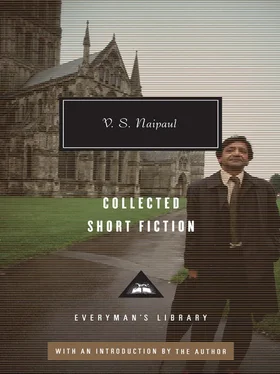My grandmother, an alarmist by nature, bent down and put her ear to the upper half of the body on the floor. ‘I don’t seem to hear her heart,’ she said.
We were all somewhat terrified. We tried to lift Gold Teeth but she seemed as heavy as lead. Then, slowly, the body quivered. The flesh beneath the clothes rippled, then billowed, and the children in the room sharpened their shrieks. Instinctively we all stood back from the body and waited to see what was going to happen. Gold Teeth’s hand began to pound the floor and at the same time she began to gurgle.
My grandmother had grasped the situation. ‘She’s got the spirit,’ she said.
At the word ‘spirit’, the children shrieked louder, and my grandmother slapped them into silence.
The gurgling resolved itself into words pronounced with a lingering ghastly quaver. ‘Hail Mary, Hail Ram,’ Gold Teeth said, ‘the snakes are after me. Everywhere snakes. Seven snakes. Rama! Rama! Full of grace. Seven spirits leaving Cunupia by the four o’clock train for Port-of-Spain.’
My grandmother and my mother listened eagerly, their faces lit up with pride. I was rather ashamed at the exhibition, and annoyed with Gold Teeth for putting me into a fright. I moved towards the door.
‘Who is that going away? Who is the young caffar , the unbeliever?’ the voice asked abruptly.
‘Come back quickly, boy,’ my grandmother whispered. ‘Come back and ask her pardon.’
I did as I was told.
‘It is all right, son,’ Gold Teeth replied, ‘you don’t know. You are young.’
Then the spirit appeared to leave her. She wrenched herself up to a sitting position and wondered why we were all there. For the rest of that evening she behaved as if nothing had happened, and she pretended she didn’t notice that everyone was looking at her and treating her with unusual respect.
‘I have always said it, and I will say it again,’ my grandmother said, ‘that these Christians are very religious people. That is why I encouraged Gold Teeth to pray to Christian things.’
Ramprasad died early next morning and we had the announcement on the radio after the local news at one o’clock. Ramprasad’s death was the only one announced and so, although it came between commercials, it made some impression. We buried him that afternoon in Mucurapo Cemetery.
As soon as we got back my grandmother said, ‘I have always said it, and I will say it again: I don’t like these Christian things. Ramprasad would have got better if only you, Gold Teeth, had listened to me and not gone running after these Christian things.’
Gold Teeth sobbed her assent; and her body squabbered and shook as she confessed the whole story of her trafficking with Christianity. We listened in astonishment and shame. We didn’t know that a good Hindu, and a member of our family, could sink so low. Gold Teeth beat her breast and pulled ineffectually at her long hair and begged to be forgiven. ‘It is all my fault,’ she cried. ‘My own fault, Ma. I fell in a moment of weakness. Then I just couldn’t stop.’
My grandmother’s shame turned to pity. ‘It’s all right, Gold Teeth. Perhaps it was this you needed to bring you back to your senses.’
That evening Gold Teeth ritually destroyed every reminder of Christianity in the house.
‘You have only yourself to blame,’ my grandmother said, ‘if you have no children now to look after you.’
1954
THEY DON’T PAY primary schoolteachers a lot in Trinidad, but they allow them to beat their pupils as much as they want.
Mr Hinds, my teacher, was a big beater. On the shelf below The Last of England he kept four or five tamarind rods. They are good for beating. They are limber, they sting and they last. There was a tamarind tree in the schoolyard. In his locker Mr Hinds also kept a leather strap soaking in the bucket of water every class had in case of fire.
It wouldn’t have been so bad if Mr Hinds hadn’t been so young and athletic. At the one school sports I went to, I saw him slip off his shining shoes, roll up his trousers neatly to mid-shin and win the Teachers’ Hundred Yards, a cigarette between his lips, his tie flapping smartly over his shoulder. It was a wine-coloured tie: Mr Hinds was careful about his dress. That was something else that somehow added to the terror. He wore a brown suit, a cream shirt and the wine-coloured tie.
It was also rumoured that he drank heavily at weekends.
But Mr Hinds had a weak spot. He was poor. We knew he gave those ‘private lessons’ because he needed the extra money. He gave us private lessons in the ten-minute morning recess. Every boy paid fifty cents for that. If a boy didn’t pay, he was kept in all the same and flogged until he paid.
We also knew that Mr Hinds had an allotment in Morvant where he kept some poultry and a few animals.
The other boys sympathized with us — needlessly. Mr Hinds beat us, but I believe we were all a little proud of him.
I say he beat us, but I don’t really mean that. For some reason which I could never understand then and can’t now, Mr Hinds never beat me. He never made me clean the blackboard. He never made me shine his shoes with the duster. He even called me by my first name, Vidiadhar.
This didn’t do me any good with the other boys. At cricket I wasn’t allowed to bowl or keep wicket and I always went in at number eleven. My consolation was that I was spending only two terms at the school before going on to Queen’s Royal College. I didn’t want to go to QRC so much as I wanted to get away from Endeavour (that was the name of the school). Mr Hinds’s favour made me feel insecure.
At private lessons one morning Mr Hinds announced that he was going to raffle a goat — a shilling a chance.
He spoke with a straight face and nobody laughed. He made me write out the names of all the boys in the class on two foolscap sheets. Boys who wanted to risk a shilling had to put a tick after their names. Before private lessons ended there was a tick after every name.
I became very unpopular. Some boys didn’t believe there was a goat. They all said that if there was a goat, they knew who was going to get it. I hoped they were right. I had long wanted an animal of my own, and the idea of getting milk from my own goat attracted me. I had heard that Mannie Ramjohn, Trinidad’s champion miler, trained on goat’s milk and nuts.
Next morning I wrote out the names of the boys on slips of paper. Mr Hinds borrowed my cap, put the slips in, took one out, said, ‘Vidiadhar, is your goat,’ and immediately threw all the slips into the wastepaper basket.
At lunch I told my mother, ‘I win a goat today.’
‘What sort of goat?’
‘I don’t know. I ain’t see it.’
She laughed. She didn’t believe in the goat, either. But when she finished laughing she said: ‘It would be nice, though.’
I was getting not to believe in the goat, too. I was afraid to ask Mr Hinds, but a day or two later he said, ‘Vidiadhar, you coming or you ain’t coming to get your goat?’
He lived in a tumbledown wooden house in Woodbrook and when I got there I saw him in khaki shorts, vest and blue canvas shoes. He was cleaning his bicycle with a yellow flannel. I was overwhelmed. I had never associated him with such dress and such a menial labour. But his manner was more ironic and dismissing than in the classroom.
He led me to the back of the yard. There was a goat. A white one with big horns, tied to a plum tree. The ground around the tree was filthy. The goat looked sullen and sleepy-eyed, as if a little stunned by the smell it had made. Mr Hinds invited me to stroke the goat. I stroked it. He closed his eyes and went on chewing. When I stopped stroking him, he opened his eyes.
Читать дальше









